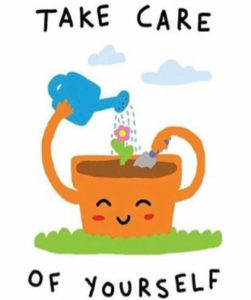
Self-Care Suggestions
I first heard the analogy of the vase from Rachel Hollis. She tells it often on her live videos and from stage. It is such powerful imagery.
Imagine a tall, glass vase standing under a non-stop flow of water. The vase symbolizes you and the flowing water stands for the things you need (sleep, nutrients, self-care, love, etc.). Around you there are several empty cups (your kids, your spouse, friends, work, etc.) waiting to be filled. As you see the needs of those around you, you tip yourself and pour from your stores into the empty cups. You keep tipping and pouring and before long, you have tipped so far that you’ve fallen over. You are empty and no longer receiving what you need and you can’t help those around you. What if, instead, you stayed standing tall and allowed the things you need to fill you up until they overflowed from you and filled those around you. When we take care of ourselves first, it is much easier to care for those around us. You can’t pour from an empty cup.

Let’s talk a bit about self-care.
Tami Forman from Forbes magazine says, “Self-care is not an indulgence. Self-care is a discipline. It requires tough-mindedness, a deep and personal understanding of your priorities, and a respect for both yourself and the people you choose to spend your life with.” She explains that self-care isn’t expensive bath products or fancy chocolates; it is doing what is good for you instead of what feels good in the moment. It is something that should be done regularly to maintain balance instead of restore balance.
In the book The Power of Full Engagement, authors Jim Loehr and Tony Schwartz tie in self-care to how much energy we have. Managing our energy makes being fully engaged possible. “To be fully engaged, we must be physically energized, emotionally connected, mentally focused and spiritually aligned with a purpose beyond our immediate self-interest.” In other words, our self-care practice should include something in each area—physical, emotional (social), mental and spiritual.
How do you practice self-care? Below are some suggestions
that fit into each category.
PHYSICAL
· exercise
· get a good night sleep
· eat the right foods and drinking enough water
· take regular breaks during the day
EMOTIONAL/SOCIAL
· do an enjoyable activity—gardening, dancing, crafting, or other hobby
· spend time with supportive friends
· keep a reflective journal
· practice gratitude
MENTAL
· read a good book
· practice a positive mindset
· challenge your thinking
SPIRITUAL
· meditate
· start a yoga practice
· spend time in your core book/scriptures

How has self-care helped me? As a brand new mom, I quickly realized that I was my best self when I got a break from my kids during the day. I made sure that all my kids napped at the same time in the afternoon and I took that time for me. Sometimes I napped too. Sometimes I would read. Sometimes I would clean something. As they got older and out grew needing a nap, we still had a quiet time. They would quietly read or play in their room, and I still had time to myself. I was almost like starting fresh with a new day. I still find this practice to be rejuvenating.
Have you benefited from self-care? Comment below with something that has worked for you.


